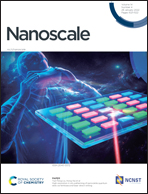pH-Responsive size-shrinkable mesoporous silica-based nanocarriers for improving tumor penetration and therapeutic efficacy†
Abstract
Poor tumor penetration is a major obstacle to nanomedicine for achieving effective anticancer therapy. Tumor microenvironment-induced nanomedicine size shrinkage is a promising strategy to overcome the drug penetration barrier across the dense tumor matrix. Herein, we design a size-shrinkable nanocarrier that uses acid as a means of triggering a change in particle size for co-achievement of efficient tumor accumulation followed by deep tumor penetration and rapid clearance from the body. This nanocarrier is constructed from a pH-sensitive lipid layer shell and an ultrasmall amino-functionalized mesoporous silica nanoparticle core capable of loading drugs. After intravenous injection into mice bearing the 4T1 tumor, the nanocarrier with an initial hydrodynamic size of about 33 nm could effectively accumulate at the tumor site through the enhanced permeability and retention effect. Subsequently, in the acidic tumor microenvironment, the lipid layer comprising 9 alkyl-spiropyran (SP-C9) undergoes a volume shrinkage due to the conversion of hydrophobic SP-C9 to amphiphilic 9 alkyl-merocyanine (MC-C9), thus leading to a significant decrease in the entire particle size (hydrodynamic size ∼17 nm) for enhanced intratumoral penetration. Moreover, we find that this size-shrinkable nanocarrier could be rapidly excreted out of the body based on the ICP analysis, significantly reducing biosafety issues. Benefiting from the effective tumor accumulation and penetration of the nanocarrier, the released doxorubicin shows potent antitumor efficacy. This demonstrates the high potential of the designed nanocarrier in solid tumor treatment.



 Please wait while we load your content...
Please wait while we load your content...